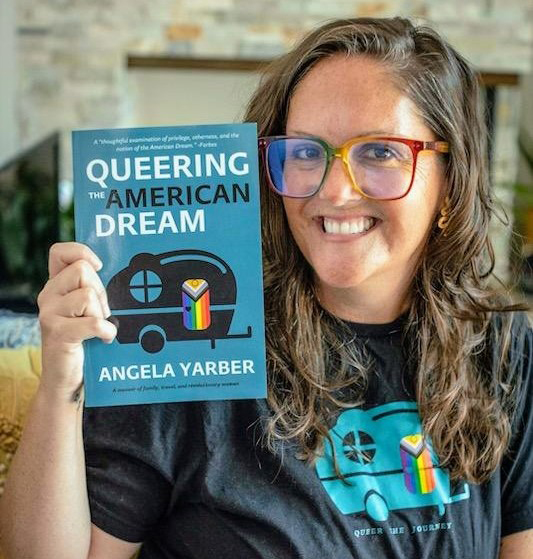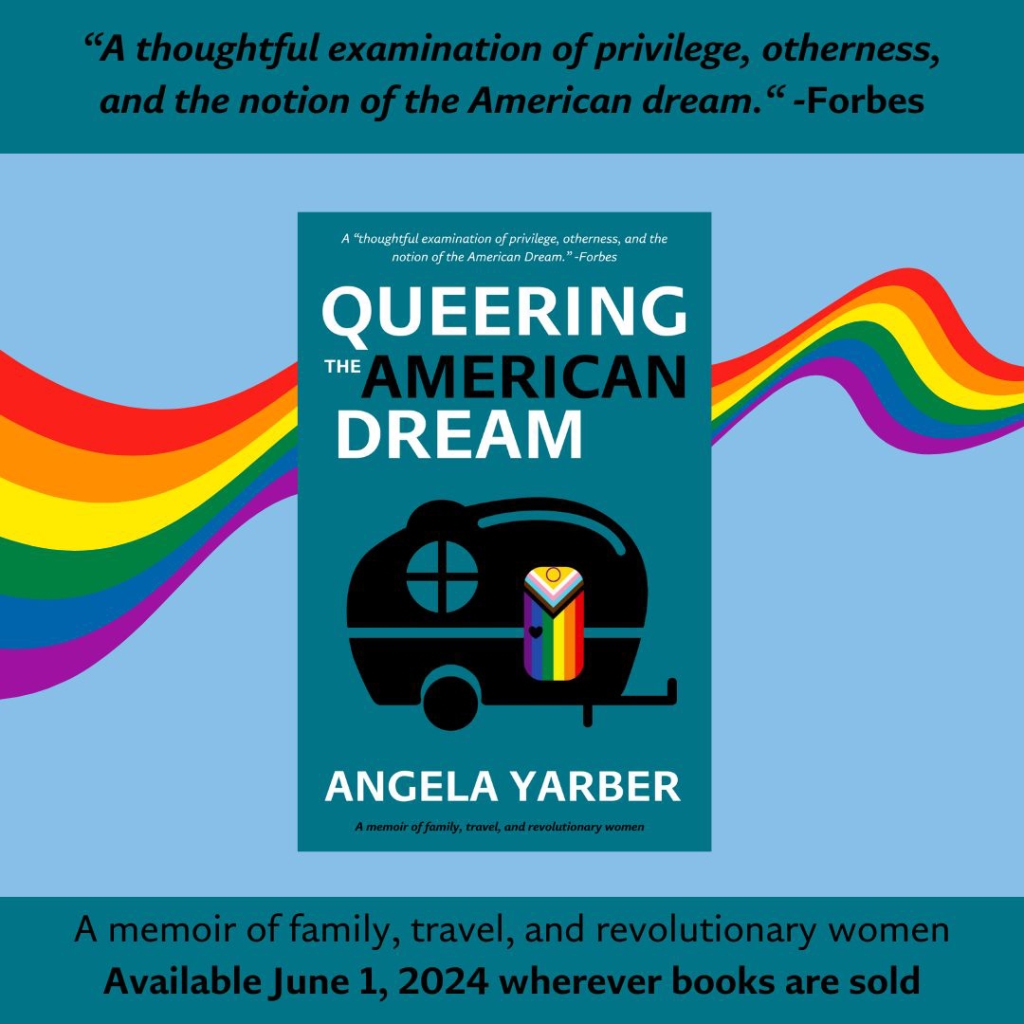
Like most authors, I had grand plans for Queering the American Dream. Heeding the wisdom of the venerable black, queer writer, Pauli Murray—“One person plus one typewriter constitutes a movement”—I committed, not simply to writing and publishing a book, but creating a movement. With my modern-day typewriter (laptop) in hand, I dreamed of readers throwing off the shackles of an ill-suited dream, galvanizing retreats, coaching to help other marginalized creatives queer their own iterations of the so-called American dream.
I tried learning about book marketing and pitching companion essays and creating a launch team and all those things small-time authors without expensive publicists on retainer do. I tried so hard.
But when this book was first published in hardback in 2022, I was still reeling. Floundering. Struggling with Bipolar II, chronic fatigue, parenting two children with disabilities, and having just been released from a residential Eating Disorder Recovery facility that prompted a six thousand mile move across an ocean and a continent, I launched this book into the world, hoping for the best.
Mental health, grief, disability, and nearly five years living below the poverty line had other plans. They sucker punched me back into bed for nine months, launch team untapped, book marketing plans out the window, the queer movement I dreamed of little more than the space between my bed and couch.
It sucked.
And when my doctors finally took me off the medication that was keeping me down, I came back to myself. I had energy, renewed hope, and the capacity to be the productive person I’d been for over forty years. I started a publishing company, Tehom Center Publishing, an imprint publishing feminist and queer authors, with a commitment to elevate BIPOC writers, and I found myself living into the movement I’d originally dreamed of with the initial publication of this book.
I wasn’t just awake and productive. I was flourishing. And I was helping other marginalized authors flourish in the process. It was nothing short of a revelation. Yet, the hardback of Queering the American Dream sat dusty in boxes, unopened for all those events I’d planned only two years prior when my health and life took a dramatic nosedive.
And I had to ask myself, “Do I let this book and this dream and this movement go? Or do I breathe new life into them?”
Girded by the wisdom of the women you’ll soon read about, I chose the latter. No longer on government assistance or medication that causes tardive dyskinesia requiring fourteen hours of daily sleep, I grabbed those old books, with their unsuccessful covers and lack of aligned marketing plans, and I began to dream new dreams.
This time, though, I didn’t limit my consultations to revolutionary women from the past—the bold ones who inspired our travels and fill the pages of the book—but I gathered the wisdom of the revolutionary women who fill my life today. I talked with dear author friends, did trainings with renowned writers, studied feminist marketing, meditated with my queer clergywomen coven, and listened to the inner wisdom that had been silenced by faulty medications. And, together, we decided to try again.
Queering anything takes creative work, after all. So, I release this book into the wild once again. This time, with a new cover, creative edits, new epilogue, and a movement that has already begun with Tehom Center Publishing.
Whenever I coach the authors at Tehom Center Publishing, I always begin with the WHY behind their book. I believe every author has two WHYs. The first is practical and the second is prophetic. The practical includes those things we activists don’t really like to talk about, such as wanting to write a book to become famous, or get rich, or build a business, or prove expertise, or check an item off a bucket list, or raise a middle finger to that eighth-grade English teacher who told us our writing would never amount to anything. Because it’s important to know why you want to publish a book in the first place.
The prophetic WHY behind writing, though, is always what gets the juices flowing because it’s the mission or heart of why you write: to make a difference in the world. Recently, an author in one of my writing cohorts turned this question back on me, asking why it is that I want to publish.
The reason is simple, yet profound. I’m publishing this book, sharing my queer family’s story with the world, because I’m sick of seeing so many marginalized people bound to the so-called dreams that have been systematically designed to disenfranchise us. Heteronormativity. White supremacy. The 9-to-5 rat race. Broken education, medical, and criminal justice systems. We’ve been told to pull ourselves up by our bootstraps by a country that has stolen our boots. And that’s not ok.
Or, to quote my queer clergywomen coven, “Honey, it’s not you. It’s the system.”
It’s rigged.
I wrote and published this book so that you can see examples of what it means to live and dream differently. Because, in the words of Toni Morrison, the only life “you can have is the one you can imagine.” My WHY is an exercise is radical imagination, of dreaming what life and work and vocation and family could look like if we heed the wisdom of queer women of color who have been dreaming creative, alternative, dismantling dreams from the jump. It wasn’t easy, but my wife and I tried to follow this queer, intersectional wisdom. And it didn’t end when this book ends, either. Rather, it is a day after day joy and struggle to truly be comadres en la lucha, co-mothers in the struggle for justice and beauty. I deserve to live such a dream. And so do you.

That’s my WHY. I invite you to consider your WHY, as well. Why do you do what you do? What systems and structures make it more difficult for you to attain your dreams? And whose wisdom are you heeding along the way?
Discover more from Feminism and Religion
Subscribe to get the latest posts sent to your email.


I am glad for you… very glad – but I cringe at the word “deserve” – maybe thinking of your story as a gift/ using gratitude to express your success would be more appropriate at this juncture? We live in a world where all peoples are struggling – less so in this country of privilege – overall – Life is impossibly hard for so many people EVERYWHERE – deserving implies privilege – and that upsets me.
LikeLike
Hi Sara, I am reading this book now (and loving it). I think you misinterpreted Angela’s meaning with “deserve.” Angela, of all people, is particularly sensitive and aware of privilege, esp. her own. I have been impressed in reading the book that she has been able to muse on the rewards that privilege brings even as she has faced serious threats to her own safety and what she calls her “queer little family” (which consists of her, her wife and their son.)
When I read Angela’s use of “deserve,” in this context, I see a message that women esp. need these days when it’s so easy to feel unworthy in a society that all too often doesn’t support our work, our values and our bodies. I see a message that we are worthy because we ARE and so for that we shouldn’t be afraid to “own it.” I know its a message I can certainly use.
LikeLiked by 1 person
It’s that word “deserve” that remains upsetting – in its usual context it is used to denote superiority… why not use worthy?
LikeLike
Thank you for inspiring me to continue trying to find a publisher. As a queer feminist woman in Canada with a lot to say, it’s been a challenge.
LikeLike